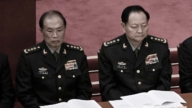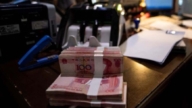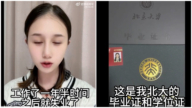【新唐人2012年2月21日讯】继去年12月下调存准率之后,中共中央银行将自24号起,再次下调存款准备金率0.5个百分点,预计向市场投放大约4000亿元人民币的流动性资金。这次调整后,中国大型金融机构和中小金融机构将分别执行20.5%和17.0%的存款准备金率。有学者认为,中国下调银行存款准备金率,并不是货币政策进入全面宽松通道,而是想缓解市场流动资金的短缺现象。
中国人民银行宣布,从2月24号开始,下调存款准备金率0.5个百分点。据了解,这次下调距离上次不到3个月。这是人民银行今年以来首次下调存款准备金率。
对此,经济学家草庵认为,当局下调准备金率的目地,是要增加货币的流动性。
经济学家草庵:“在不久前中国政府认为经济过热,所以连续上提央行准备金率,但是在目前为止显示一个问题,中国经济逐渐走下坡,所以资金流动出现了大问题,明显的标示就是地下金融募集资金的渠道断裂,造成民营企业的资金周转不灵,同时现在中国的主要房地产业,其他工厂的开工,都出现了资金短缺的问题。”
草庵表示,在这种情况下,中共又面临连续三个月外商在中国的投资下降,造成中国经济的恶化,失业率大幅度的增加,所以当局采取一个措施,就是增加资金的流动性。
经济学家草庵:“但是现在采取的这种状况,它还不是幅度很大,我想它会连续几个月都下调,我想至少在半年之内,它会逐渐逐渐的下调,放松这个资金管制。”
另外,这次下调存款准备金率将释放4000多亿元的流动性资金,但下调不等于宽松,黑龙江经济学者廖诚表示,中国房地产泡沫化的连锁反应,导致经济紧张,中共当局当然希望民间存款利息越少越好,放贷的利息越高越好,因为它是一种垄断行为。
黑龙江经济学者廖诚:“把这个钱都挤压到垄断行业、国有企业这块,完了它好利用这些资金、利润,去调解一些就是解决一些燃眉之急,来缓解它的危机,它现在是不择手段了,不管怎么做,它都是来缓解房地产泡沫导致这个金融危机的连锁反应,和政府腐败的形象工程。”
中国“人民大学金融与证券研究所”所长吴晓求,对于这次下调银行准备金率,他分析有两个原因,第一,暗示2月份的CPI﹙消费者物价指数﹚数字可能不乐观。第二,本不宽裕的银行间市场资金面再度绷紧,外汇占款未来可能呈长期下降之势。
中共当局的统计数据显示,外汇占款已经连续3个月下降,12月外汇存底减少398亿美元。学者认为,中国经济面临经济滑坡与物价上涨的双重压力。
新唐人记者常春、黄容、柏妮采访报导。
CCP’s Central Bank Reduces Deposit Ratio to Ease Market Liquidity
Following last December’s cut on deposit interest rates, the
Chinese Communist Party (CCP)’s Central Bank will lower
its deposit reserve ratio by 0.5 percentage points starting Feb. 24th,
and is expected to invest 400 billion yuan of market liquidity.
After this adjustment, large financial institutions and
small and medium-sized financial institutions will perform 20.5% and 17.0% of the deposit reserve ratio.
Some scholars believe China’s reduction of bank deposit reserve
ratio is not a sign of comprehensive monetary liberty, but to ease the shortage of market liquidity.
People’s Bank of China announced it will lower its deposit reserve
ratio by 0.5 percentage points starting Feb. 24th.
This cut is less than three months from the last one, and the
first time the People’s Bank cut deposit reserve ratio in 2012.
Economist Caoan thinks the goal to lower deposit reserve ratio
is to increase the flow of money.
Economist Caoan: “Not long ago, the Chinese regime believed the
economy is overheating, so it raised the central bank’s reserve ratio.
But at present, it shows a problem that China’s economy is going
downhill, and there are huge problems on funds.
A clear manifestation is the fracture of underground funds rising,
causing cash flow problems for private enterprises.
At the same time, China’s major real estate enterprises and
other factories have shortage of funds”
Caoan said that on top of that the CCP is facing a three months
decline of foreign investment in China.
This has resulted in the deterioration of China’s economy and
a substantially increased unemployment rate.
For this reason the CCP took the approach of increasing
the flow of money.
Economist Caoan: “It’s not doing it on a large magnitude.
I think it (CCP) will lower the rate in the next several months, for at least half a year to ease capital control.”
This reduction on deposit reserve ratio will release
more than 400 billion yuan of liquidity. But lowering the ratio does not mean ease of control.
Heilongjiang economist Liao Cheng said that the chain reaction of
the Chinese real estate bubble will lead to economic tensions.
The CCP authorities certainly hope to drive the private deposit
interest as low as possible, and the lending interest as high as possible, because it is a kind of monopolistic behavior.
Helongjiang Economist Liao Cheng: “It (CCP) squeezes all the
money to the monopolistic enterprises, the state-owned enterprises.
Then it can use the money and profits to solve some urgent issues
and ease its own crisis. It is unscrupulous.
Whatever it does, it is to ease the financial crises caused by
the real estate bubble and its corrupt image.”
People’s University Finance and Securities Institute Director
Wu Xiaoqiu suggests two reasons for the bank reserve ratio cut.
One would be that the February CPI (Consumer Price Index)
figures may not be optimistic;
and the second that the not well-off inter-bank market fund
is once again tight. And so the foreign reserve might decline in the long run.
According to CCP authorities’ data, the foreign exchange has
declined for three months consecutively.
In December 2011, the foreign reserve declined $39.8 billion.
Scholars believe China’s economy is facing a double pressure,
that from the economic downturn and from the price hike.
NTD reporters Chang Chun, Huang Rong and Bo Ni






























